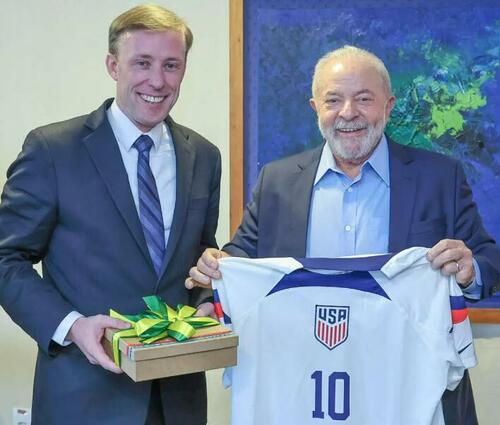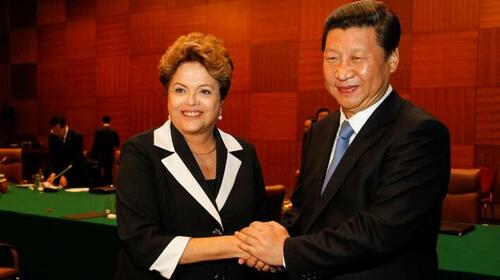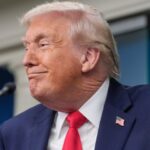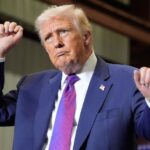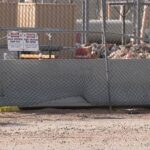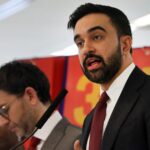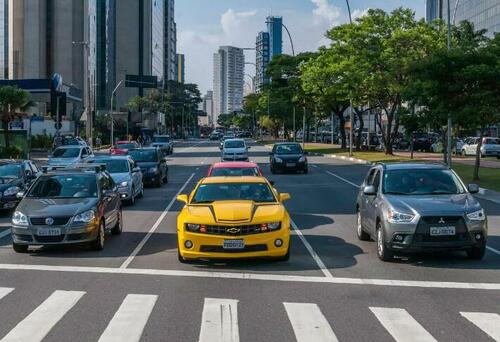
Authored by Pepe Escobar,
Bolsonaro reduced Brazil to resources-exporter status; now Lula should follow Argentina’s lead into Belt and Road...
Ten days of full immersion in Brazil are not for the faint-hearted. Even restricted to the top two megalopolises, Sao Paulo and Rio, watching live the impact of interlocking economic, political, social and environmental crises exacerbated by the Jair Bolsonaro project leaves one stunned.
The return of Luiz Inácio Lula da Silva for what will be his third presidential term, starting January 1, 2023, is an extraordinary story trespassed by Sisyphean tasks. All at the same time he will have to
-
fight poverty;
-
reconnect with economic development while redistributing wealth;
-
re-industrialize the nation; and
-
tame environmental pillage.
That will force his new government to summon unforeseen creative powers of political and financial persuasion.
Even a mediocre, conservative politician such as Geraldo Alckmin, former governor of the wealthiest state of the union, Sao Paulo, and coordinator of the presidential transition, was simply astonished at how four years of the Bolsonaro project let loose a cornucopia of vanished documents, a black hole concerning all sorts of data and inexplicable financial losses.
It’s impossible to ascertain the extent of corruption across the spectrum because simply nothing is in the books: Governmental systems have not been fed since 2020.
Alckmin summed it all up: “The Bolsonaro government happened in the Stone Age, where there were no words and numbers.”
Now every single public policy will have to be created, or re-created from scratch, and serious mistakes will be inevitable because of lack of data.
And we’re not talking about a banana republic – even though the country concerned features plenty of (delicious) bananas.
By purchasing power parity (PPP), according to the International Monetary Fund (IMF), Brazil remains the eighth-ranked economic power in the world even after the Bolsonaro devastation years – behind China, the US, India, Japan, Germany, Russia and Indonesia, and ahead of the UK and France.
A concerted imperial campaign since 2010, duly denounced by WikiLeaks, and implemented by local comprador elites, targeted the Dilma Rousseff presidency – the Brazilian national entrepreneurial champions – and led to Rousseff’s (illegal) impeachment and the jailing of Lula for 580 days on spurious charges (all subsequently dropped), paved the way for Bolsonaro to win the presidency in 2018.
Were it not for this accumulation of disasters, Brazil – a natural leader of the Global South – by now might possibly be placed as the fifth-largest geo-economic power in the world.
What the investment gang wants
Paulo Nogueira Batista Jr, a former vice-president of the New Development Bank (NDB), or BRICS bank, goes straight to the point: Brazil’s dependence on Lula is immensely problematic.
Batista sees Lula facing at least three hostile blocs.
-
The extreme right supported by a significant, powerful faction of the armed forces – and this includes not only Bolsonarists, who are still in front of a few army barracks contesting the presidential election result;
-
The physiological right that dominates Congress – known in Brazil as “The Big Center”;
-
International financial capital – which, predictably, controls the bulk of mainstream media.
The third bloc, to a great extent, gleefully embraced Lula’s notion of a United Front capable of defeating the Bolsonaro project (which project, by the way, never ceased to be immensely profitable for the third bloc).
Now they want their cut. Mainstream media instantly turned to corralling Lula, operating a sort of “financial inquisition,” as described by crack economist Luiz Gonzaga Belluzzo.
By appointing longtime Workers’ Party loyalist Fernando Haddad as finance minister, Lula signaled that he, in fact, will be in charge of the economy. Haddad is a political-science professor and was a decent minister of education, but he’s no sharp economic guru. Acolytes of the Goddess of the Market, of course, dismiss him.
Once again, this is the trademark Lula swing in action: He chose to place more importance on what will be complex, protracted negotiations with a hostile Congress to advance his social agenda, confident that all the lineaments of economic policy are in his head.
A lunch party with some members of Sao Paulo’s financial elite, even before Haddad’s name was announced, offered a few fascinating clues. These people are known as the “Faria Limers” – after the high-toned Faria Lima Avenue, which houses quite a few post-mod investment banks’ offices as well as Google and Facebook HQs.
Faria Lima Avenue in San Paulo. Photo: Wikimedia Commons
Lunch attendees included a smattering of rabid anti-Workers’ Party investors, the proverbial unreconstructed neoliberals, yet most were enthusiastic about opportunities ahead to make a killing, including an investor looking for deals involving Chinese companies.
The neoliberal mantra of those willing – perhaps – to place their bets on Lula (for a price) is “fiscal responsibility.” That frontally clashes with Lula’s focus on social justice.
That’s where Haddad comes up as a helpful, polite interlocutor because he does privilege nuance, pointing out that only looking at market indicators and forgetting about the 38% of Brazilians who only earn the minimum wage (1,212 Brazilian real or US$233 per month) is not exactly good for business.
The dark arts of non-government
Lula is already winning his first battle: approving a constitutional amendment that allows financing of more social spending.
That allows the government to keep the flagship Bolsa Família welfare program – of roughly $13 a month per poverty-level family – at least for the next two years.
A stroll across downtown Sao Paulo – which in the 1960s was as chic as mid-Manhattan – offers a sorrowful crash course on impoverishment, shut-down businesses, homelessness and raging unemployment. The notorious “Crack Land” – once limited to a street – now encompasses a whole neighborhood, much like junkie, post-pandemic Los Angeles.
Rio offers a completely different vibe if one goes for a walk in Ipanema on a sunny day, always a smashing experience. But Ipanema lives in a bubble. The real Rio of the Bolsonaro years – economically massacred, de-industrialized, occupied by militias – came up in a roundtable downtown where I interacted with, among others, a former energy minister and the man who discovered the immensely valuable pre-salt oil reserves.
In the Q&A, a black man from a very poor community advanced the key challenge for Lula’s third term: To be stable, and able to govern, he has to have the vast poorest sectors of the population backing him up.
This man voiced what seems not to be debated in Brazil at all: How did there come to be millions of poor Bolsonarists – street cleaners, delivery guys, the unemployed? Right-wing populism seduced them – and the established wings of the woke left had, and still have, nothing to offer them.
Addressing this problem is as serious as the destruction of Brazilian engineering giants by the Car Wash “corruption” racket. Brazil now has a huge number of well-qualified unemployed engineers. How come they have not amassed enough political organization to reclaim their jobs? Why should they resign themselves to becoming Uber drivers?
José Manuel Salazar-Xirinachs, the new head of the UN Economic Commission on Latin America and the Caribbean (ECLAC), may carp about the region’s economic failure as even worse now than in the “lost decade” of the 1980s: Average annual economic growth in Latin America in the decade up to 2023 is set to be just 0.8%.
Yet what the UN is incapable of analyzing is how a plundering neoliberal regime such as Bolsonaro’s managed to “elevate” to unforeseen toxic levels the dark arts of little or no investment, low productivity and less than zero emphasis on education.
President Dilma in da house
Lula was quick to summarize Brazil’s new foreign policy – which will go totally multipolar, with emphasis on increasing Latin American integration, stronger ties across the Global South and a push to reform the UN Security Council (in sync with BRICS members Russia, China and India).
Mauro Vieira, an able diplomat, will be the new foreign minister. But the man fine-tuning Brazil on the world stage will be Celso Amorim, Lula’s former foreign minister from 2003 to 2010.
In a conference that reunited us in Sao Paulo, Amorim elaborated on the complexity of the world Lula is now inheriting, compared with 2003. Yet along with climate change the main priorities – achieving closer integration with South America, reviving Unasur (the Union of South American Nations) and re-approaching Africa – remain the same.
And then there’s the Holy Grail: “good relations with both the US and China.”
The Empire, predictably, will be on extreme close watch. US national security adviser Jake Sullivan dropped in to Brasilia, during the fist days of the World Cup soccer tournament, and was absolutely charmed by Lula, who’s a master of charisma. Yet the Monroe Doctrine always prevails. Lula getting closer and closer to BRICS – and the expanded BRICS+ – is considered virtual anathema in Washington.
Jake Sullivan and Lula in Brasilia on November 28. Photo: Ricardo Stuckert
So Lula will play most overtly in the environment arena. Covertly, it will be a sophisticated balancing act.
The combo behind US President Joe Biden called Lula to congratulate him soon after the election results. Sullivan was in Brasilia setting the stage for a Lula visit to Washington. Chinese President Xi Jinping for his part sent him an affectionate letter, emphasizing the “global strategic partnership” between Brazil and China. Russian President Vladimir Putin called Lula earlier this week – and emphasized their common strategic approach to BRICS.
China has been Brazil’s top trade partner since 2009, ahead of the US. Bilateral trade in 2021 hit $135 billion. The problem is lack of diversification and focus on low added value: iron ore, soybeans, raw crude and animal protein accounted for 87.4% of exports in 2021. China exports, on the other hand, are mostly high-tech manufactured products.
Brazil’s dependence on commodity exports has indeed contributed for years to its rising foreign reserves. But that implies high concentration of wealth, low taxes, low job creation and dependence on cyclical price oscillations.
There’s no question China is focused on Brazilian natural resources to fuel its new development push – or “peaceful modernization,” as established by the latest Party Congress.
But Lula will have to strive for a more equal trade balance in case he manages to restart the nation as a solid economy. In 2000, for instance, Brazil’s top export item was Embraer jets. Now, it’s iron ore and soybeans; yet another dire indicator of the ferocious de-industrialization operated by the Bolsonaro project.
China is already investing substantially in the Brazilian electric sector – mostly due to state companies being bought by Chinese companies. That was the case in 2017 of State Grid buying CPFL in Sao Paulo, for instance, which in turn bought a state company from southern Brazil in 2021.
From Lula’s point of view, that’s inadmissible: a classic case of privatization of strategic public assets.
A different scenario plays in neighboring Argentina. Buenos Aires in February became an official partner of the New Silk Roads, or Belt and Road Initiative, with at least $23 billion in new projects on the pipeline. The Argentine railway system will be upgraded by – who else? – Chinese companies, to the tune of $4.6 billion.
The Chinese will also be investing in the largest solar energy plant in Latin America, a hydroelectric plant in Patagonia, and a nuclear energy plant – complete with transfer of Chinese technology to the Argentine state.
Lula, beaming with invaluable soft power not only personally when it comes to Xi but also appealing to Chinese public opinion, can get similar strategic partnership deals, with even more amplitude. Brasilia may follow the Iranian partnership model – offering oil and gas in exchange for building critical infrastructure.
Inevitably, the golden path ahead will be via joint ventures, not mergers and acquisitions. No wonder many in Rio are already dreaming of high-speed rail linking it to Sao Paulo in just over an hour, instead of the current, congested highway journey of six hours (if you’re lucky).
A key role will be played by former president Dilma Rousseff, who had a long, leisurely lunch with a few of us in Sao Paulo, taking her time to recount, in minutiae, everything from the day she was officially arrested by the military dictatorship (January 16, 1970) to her off-the-record conversations with then-German chancellor Angela Merkel, Putin, and Xi.
President Dilma Rousseff during a bilateral meeting with the president of the People’s Republic of China, Xi Jinping, at the G20 Saint Petersburg summit in 2013. Photo: Wikimedia Commons
It goes without saying that her political – and personal – capital with both Xi and Putin is stellar. Lula offered her any post she wanted in the new government. Although still a state secret, this will be part of a serious drive to polish Brazil’s global profile, especially across the Global South.
To recover from the previous, disastrous six years – which included a two-year no man’s land (2016-2018) after the impeachment of president Dilma – Brazil will need an unparalleled national drive of re-industrialization at virtually every level, complete with serious investment in research and development, training of specialized work forces and technology transfer.
There is a superpower that can play a crucial role in this process: China, Brazil’s close partner in the expanding BRICS+. Brazil is one of the natural leaders of the Global South, a role much prized by the Chinese leadership.
The key now is for both partners to establish a high-level strategic dialogue – all over again. Lula’s first high-profile foreign visit may be to Washington. But the destination that really matters, as we watch the river of history flow, will be Beijing.
Authored by Pepe Escobar,
Bolsonaro reduced Brazil to resources-exporter status; now Lula should follow Argentina’s lead into Belt and Road…
Ten days of full immersion in Brazil are not for the faint-hearted. Even restricted to the top two megalopolises, Sao Paulo and Rio, watching live the impact of interlocking economic, political, social and environmental crises exacerbated by the Jair Bolsonaro project leaves one stunned.
The return of Luiz Inácio Lula da Silva for what will be his third presidential term, starting January 1, 2023, is an extraordinary story trespassed by Sisyphean tasks. All at the same time he will have to
-
fight poverty;
-
reconnect with economic development while redistributing wealth;
-
re-industrialize the nation; and
-
tame environmental pillage.
That will force his new government to summon unforeseen creative powers of political and financial persuasion.
Even a mediocre, conservative politician such as Geraldo Alckmin, former governor of the wealthiest state of the union, Sao Paulo, and coordinator of the presidential transition, was simply astonished at how four years of the Bolsonaro project let loose a cornucopia of vanished documents, a black hole concerning all sorts of data and inexplicable financial losses.
It’s impossible to ascertain the extent of corruption across the spectrum because simply nothing is in the books: Governmental systems have not been fed since 2020.
Alckmin summed it all up: “The Bolsonaro government happened in the Stone Age, where there were no words and numbers.”
Now every single public policy will have to be created, or re-created from scratch, and serious mistakes will be inevitable because of lack of data.
And we’re not talking about a banana republic – even though the country concerned features plenty of (delicious) bananas.
By purchasing power parity (PPP), according to the International Monetary Fund (IMF), Brazil remains the eighth-ranked economic power in the world even after the Bolsonaro devastation years – behind China, the US, India, Japan, Germany, Russia and Indonesia, and ahead of the UK and France.
A concerted imperial campaign since 2010, duly denounced by WikiLeaks, and implemented by local comprador elites, targeted the Dilma Rousseff presidency – the Brazilian national entrepreneurial champions – and led to Rousseff’s (illegal) impeachment and the jailing of Lula for 580 days on spurious charges (all subsequently dropped), paved the way for Bolsonaro to win the presidency in 2018.
Were it not for this accumulation of disasters, Brazil – a natural leader of the Global South – by now might possibly be placed as the fifth-largest geo-economic power in the world.
What the investment gang wants
Paulo Nogueira Batista Jr, a former vice-president of the New Development Bank (NDB), or BRICS bank, goes straight to the point: Brazil’s dependence on Lula is immensely problematic.
Batista sees Lula facing at least three hostile blocs.
-
The extreme right supported by a significant, powerful faction of the armed forces – and this includes not only Bolsonarists, who are still in front of a few army barracks contesting the presidential election result;
-
The physiological right that dominates Congress – known in Brazil as “The Big Center”;
-
International financial capital – which, predictably, controls the bulk of mainstream media.
The third bloc, to a great extent, gleefully embraced Lula’s notion of a United Front capable of defeating the Bolsonaro project (which project, by the way, never ceased to be immensely profitable for the third bloc).
Now they want their cut. Mainstream media instantly turned to corralling Lula, operating a sort of “financial inquisition,” as described by crack economist Luiz Gonzaga Belluzzo.
By appointing longtime Workers’ Party loyalist Fernando Haddad as finance minister, Lula signaled that he, in fact, will be in charge of the economy. Haddad is a political-science professor and was a decent minister of education, but he’s no sharp economic guru. Acolytes of the Goddess of the Market, of course, dismiss him.
Once again, this is the trademark Lula swing in action: He chose to place more importance on what will be complex, protracted negotiations with a hostile Congress to advance his social agenda, confident that all the lineaments of economic policy are in his head.
A lunch party with some members of Sao Paulo’s financial elite, even before Haddad’s name was announced, offered a few fascinating clues. These people are known as the “Faria Limers” – after the high-toned Faria Lima Avenue, which houses quite a few post-mod investment banks’ offices as well as Google and Facebook HQs.
Faria Lima Avenue in San Paulo. Photo: Wikimedia Commons
Lunch attendees included a smattering of rabid anti-Workers’ Party investors, the proverbial unreconstructed neoliberals, yet most were enthusiastic about opportunities ahead to make a killing, including an investor looking for deals involving Chinese companies.
The neoliberal mantra of those willing – perhaps – to place their bets on Lula (for a price) is “fiscal responsibility.” That frontally clashes with Lula’s focus on social justice.
That’s where Haddad comes up as a helpful, polite interlocutor because he does privilege nuance, pointing out that only looking at market indicators and forgetting about the 38% of Brazilians who only earn the minimum wage (1,212 Brazilian real or US$233 per month) is not exactly good for business.
The dark arts of non-government
Lula is already winning his first battle: approving a constitutional amendment that allows financing of more social spending.
That allows the government to keep the flagship Bolsa Família welfare program – of roughly $13 a month per poverty-level family – at least for the next two years.
A stroll across downtown Sao Paulo – which in the 1960s was as chic as mid-Manhattan – offers a sorrowful crash course on impoverishment, shut-down businesses, homelessness and raging unemployment. The notorious “Crack Land” – once limited to a street – now encompasses a whole neighborhood, much like junkie, post-pandemic Los Angeles.
Rio offers a completely different vibe if one goes for a walk in Ipanema on a sunny day, always a smashing experience. But Ipanema lives in a bubble. The real Rio of the Bolsonaro years – economically massacred, de-industrialized, occupied by militias – came up in a roundtable downtown where I interacted with, among others, a former energy minister and the man who discovered the immensely valuable pre-salt oil reserves.
In the Q&A, a black man from a very poor community advanced the key challenge for Lula’s third term: To be stable, and able to govern, he has to have the vast poorest sectors of the population backing him up.
This man voiced what seems not to be debated in Brazil at all: How did there come to be millions of poor Bolsonarists – street cleaners, delivery guys, the unemployed? Right-wing populism seduced them – and the established wings of the woke left had, and still have, nothing to offer them.
Addressing this problem is as serious as the destruction of Brazilian engineering giants by the Car Wash “corruption” racket. Brazil now has a huge number of well-qualified unemployed engineers. How come they have not amassed enough political organization to reclaim their jobs? Why should they resign themselves to becoming Uber drivers?
José Manuel Salazar-Xirinachs, the new head of the UN Economic Commission on Latin America and the Caribbean (ECLAC), may carp about the region’s economic failure as even worse now than in the “lost decade” of the 1980s: Average annual economic growth in Latin America in the decade up to 2023 is set to be just 0.8%.
Yet what the UN is incapable of analyzing is how a plundering neoliberal regime such as Bolsonaro’s managed to “elevate” to unforeseen toxic levels the dark arts of little or no investment, low productivity and less than zero emphasis on education.
President Dilma in da house
Lula was quick to summarize Brazil’s new foreign policy – which will go totally multipolar, with emphasis on increasing Latin American integration, stronger ties across the Global South and a push to reform the UN Security Council (in sync with BRICS members Russia, China and India).
Mauro Vieira, an able diplomat, will be the new foreign minister. But the man fine-tuning Brazil on the world stage will be Celso Amorim, Lula’s former foreign minister from 2003 to 2010.
In a conference that reunited us in Sao Paulo, Amorim elaborated on the complexity of the world Lula is now inheriting, compared with 2003. Yet along with climate change the main priorities – achieving closer integration with South America, reviving Unasur (the Union of South American Nations) and re-approaching Africa – remain the same.
And then there’s the Holy Grail: “good relations with both the US and China.”
The Empire, predictably, will be on extreme close watch. US national security adviser Jake Sullivan dropped in to Brasilia, during the fist days of the World Cup soccer tournament, and was absolutely charmed by Lula, who’s a master of charisma. Yet the Monroe Doctrine always prevails. Lula getting closer and closer to BRICS – and the expanded BRICS+ – is considered virtual anathema in Washington.
Jake Sullivan and Lula in Brasilia on November 28. Photo: Ricardo Stuckert
So Lula will play most overtly in the environment arena. Covertly, it will be a sophisticated balancing act.
The combo behind US President Joe Biden called Lula to congratulate him soon after the election results. Sullivan was in Brasilia setting the stage for a Lula visit to Washington. Chinese President Xi Jinping for his part sent him an affectionate letter, emphasizing the “global strategic partnership” between Brazil and China. Russian President Vladimir Putin called Lula earlier this week – and emphasized their common strategic approach to BRICS.
China has been Brazil’s top trade partner since 2009, ahead of the US. Bilateral trade in 2021 hit $135 billion. The problem is lack of diversification and focus on low added value: iron ore, soybeans, raw crude and animal protein accounted for 87.4% of exports in 2021. China exports, on the other hand, are mostly high-tech manufactured products.
Brazil’s dependence on commodity exports has indeed contributed for years to its rising foreign reserves. But that implies high concentration of wealth, low taxes, low job creation and dependence on cyclical price oscillations.
There’s no question China is focused on Brazilian natural resources to fuel its new development push – or “peaceful modernization,” as established by the latest Party Congress.
But Lula will have to strive for a more equal trade balance in case he manages to restart the nation as a solid economy. In 2000, for instance, Brazil’s top export item was Embraer jets. Now, it’s iron ore and soybeans; yet another dire indicator of the ferocious de-industrialization operated by the Bolsonaro project.
China is already investing substantially in the Brazilian electric sector – mostly due to state companies being bought by Chinese companies. That was the case in 2017 of State Grid buying CPFL in Sao Paulo, for instance, which in turn bought a state company from southern Brazil in 2021.
From Lula’s point of view, that’s inadmissible: a classic case of privatization of strategic public assets.
A different scenario plays in neighboring Argentina. Buenos Aires in February became an official partner of the New Silk Roads, or Belt and Road Initiative, with at least $23 billion in new projects on the pipeline. The Argentine railway system will be upgraded by – who else? – Chinese companies, to the tune of $4.6 billion.
The Chinese will also be investing in the largest solar energy plant in Latin America, a hydroelectric plant in Patagonia, and a nuclear energy plant – complete with transfer of Chinese technology to the Argentine state.
Lula, beaming with invaluable soft power not only personally when it comes to Xi but also appealing to Chinese public opinion, can get similar strategic partnership deals, with even more amplitude. Brasilia may follow the Iranian partnership model – offering oil and gas in exchange for building critical infrastructure.
Inevitably, the golden path ahead will be via joint ventures, not mergers and acquisitions. No wonder many in Rio are already dreaming of high-speed rail linking it to Sao Paulo in just over an hour, instead of the current, congested highway journey of six hours (if you’re lucky).
A key role will be played by former president Dilma Rousseff, who had a long, leisurely lunch with a few of us in Sao Paulo, taking her time to recount, in minutiae, everything from the day she was officially arrested by the military dictatorship (January 16, 1970) to her off-the-record conversations with then-German chancellor Angela Merkel, Putin, and Xi.
President Dilma Rousseff during a bilateral meeting with the president of the People’s Republic of China, Xi Jinping, at the G20 Saint Petersburg summit in 2013. Photo: Wikimedia Commons
It goes without saying that her political – and personal – capital with both Xi and Putin is stellar. Lula offered her any post she wanted in the new government. Although still a state secret, this will be part of a serious drive to polish Brazil’s global profile, especially across the Global South.
To recover from the previous, disastrous six years – which included a two-year no man’s land (2016-2018) after the impeachment of president Dilma – Brazil will need an unparalleled national drive of re-industrialization at virtually every level, complete with serious investment in research and development, training of specialized work forces and technology transfer.
There is a superpower that can play a crucial role in this process: China, Brazil’s close partner in the expanding BRICS+. Brazil is one of the natural leaders of the Global South, a role much prized by the Chinese leadership.
The key now is for both partners to establish a high-level strategic dialogue – all over again. Lula’s first high-profile foreign visit may be to Washington. But the destination that really matters, as we watch the river of history flow, will be Beijing.
Loading…
